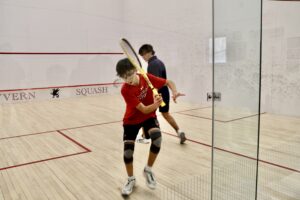April 04, 2025
Quinn Waldron ’29 Named “Most Improved Player” by US National Squash:
In a remarkable testament to hard work, passion, and perseverance, Quinn Waldron ’29 was recognized as the Most Improved Player in the United States at the US National Squash Championship in Philadelphia. Quinn climbed from #99 to #25 in the national rankings and pulled off a remarkable first-round upset against the #12 seed at the championships. Still early in his squash journey, Quinn has already captured the attention of the national squash community, and for good reason. With dynamic court presence, fierce determination, and an unwavering love for the game, Quinn’s story is one of both natural talent and a drive to keep getting better.

We sat down with Quinn’s KO’s boys’ varsity squash coach, Robby Lingashi, to better understand the qualities that set this young athlete apart.
Though Quinn’s parents don’t play squash, the sport runs deep in the Waldron family. His two older brothers played, and that really motivated him to push himself, Lingashi said. “I think he started at KO in sixth grade,” his coach recalls. “But when he showed up, he already knew how to play. He’d actually joined the Wyvern Squash Club on Highland Street before starting school here,” Lingashi said.
Early on, it was clear Quinn wasn’t just another middle schooler picking up a racket—he was already making varsity-level waves. “We had a couple of middle schoolers who were really varsity material—Quinn was definitely one of them. He was right there with the top guys, like my son Ryan. His motivation and competitiveness stood out.”
What makes Quinn unique? According to Lingashi, it’s all about his mindset.
“He likes to win. That’s a very good thing,” he says with a laugh. “But more importantly, he has fun. He chases down every ball, never lets up. I always tell the other players—‘You want to play like Quinn.’”
Tactically, Quinn is sharp, too. He trains both at school and at Hartford Golf Club under the guidance of Mick Roberts. “He gets the best of both worlds,” his coach explains. “School team experience and private training—he’s soaking up all the knowledge.”
Despite being younger than many of his teammates and competitors, Quinn has earned nothing but respect.
“At our school, the culture is about seniors supporting the juniors,” his coach says. “Guys like Jack Kieble ’25 and Ryan Sadowski ’25—they cheer him on. Even if Quinn could beat some seniors, it’s all about making the team stronger for Nationals and New Englands.”
That support paid off: this year, the Kingswood Oxford team took third place at Nationals, a huge achievement for a day school competing with elite boarding schools that often recruit players from around the world.
Quinn might be small in stature, but he plays big. One memory stands out: “We were playing Williston, and he went up against a senior who was like six-foot-seven,” Lingashi remembers, laughing. “It looked like David vs. Goliath. I took a photo—it was hilarious. But Quinn just destroyed it out there.”
His confidence doesn’t come from cockiness—it’s from preparation and heart. Even when facing players built like grown men, Quinn brings fight to the court.
Recently, Quinn competed in a major tournament in Boston, where he was seeded number one. But during the semifinals, a freak accident halted his run.
“He got hit in the hand with a racket—his right hand, on the fingers,” his coach explains. “Nothing was broken, but it was badly bruised. He couldn’t really grip the racket and had to forfeit. He still came in third, which is pretty amazing.”
It’s a setback, but knowing Quinn, it’ll only make him hungrier.
“If you’re serious about playing in college, KO is a great fit,” his coach says. “We run a strong program here.” He adds that while boarding schools offer excellent education, they don’t always provide the consistent, quality coaching young athletes like Quinn need to thrive.
And at the college level? Things are changing fast. “Ten years ago, schools like UVA didn’t even have a squash program. Now they’ve got top-tier facilities. With squash becoming an Olympic sport and more schools investing in programs, the opportunities are growing.”
Even for players not at the D1 level, college squash offers options. “There’s also club squash—still competitive, still community-driven. There’s a place for everyone now.”
As KO expands its squash program, Quinn isn’t just benefiting from the growth—he’s a symbol of it. The school hopes to attract more young players through partnerships with local middle schools, and Quinn’s story is one they’re proud to share.
“He’s an example to the rest of the team and the community,” his coach says. “Hard work, humility, and heart—that’s Quinn Waldron.”
News Main News
